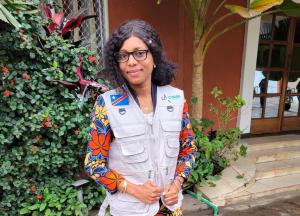Dr Aurélie Mambu: Strengthening the Fight Against AMR to Save Lives
Antimicrobial resistance (AMR) is one of the most pressing health challenges of our time. It threatens the effectiveness of treatments, increases healthcare costs, and endangers millions of lives.
We spoke with Dr Aurélie Mambu Nsimba, pharmacist and Head of the Regulatory Quality Assurance Office at the Congolese Pharmaceutical Regulatory Authority, to understand the issues and solutions.
Why is antimicrobial resistance considered a global health threat?
AMR undermines our ability to treat common infections effectively. When bacteria become resistant, standard treatments fail, forcing the use of more expensive and sometimes toxic drugs. In cases of multidrug resistance, there may be no therapeutic options at all, leading to severe complications and deaths. This situation weakens health systems and threatens decades of medical progress.
What are the main causes of AMR in Africa and what specific challenges do you face in ensuring medicine quality?
In Africa, AMR is driven by inappropriate use, self-medication, misuse of antibiotics in livestock, and poor hygiene in healthcare facilities. Major challenges include weak regulations allowing counterfeit medicines to circulate, lack of strict control over dispensing, and pharmacies run by non-professionals. These factors fuel the spread of resistant bacteria and complicate the fight against AMR.
How can healthcare professionals help reduce AMR in their daily practice?
Prescribers should follow treatment guidelines, limit prescriptions to confirmed infections, and prioritize antibiotics from the Access group. The Access group, defined by WHO, includes essential, effective, and safe antibiotics for common infections. They are cheaper, more available, and have a lower resistance potential compared to powerful antibiotics reserved for severe cases. Using them as a first option helps preserve treatment effectiveness for the future.
When available, antibiograms should guide treatment choices. Pharmacists must avoid dispensing without prescriptions and ensure product quality by sourcing from authorized distributors. These accessible yet rigorous practices are essential to slow AMR progression.
What simple advice would you give patients to avoid inappropriate antibiotic use?
Never take antibiotics without medical advice. Strictly follow the dose and duration prescribed by your doctor. Avoid buying from informal sources—always choose licensed pharmacies to ensure medicine quality. These simple actions protect your health and help limit the spread of resistance, which threatens treatment effectiveness for everyone.
What initiatives or innovations do you foresee to strengthen the fight against AMR in Africa?
Improving access to reliable diagnostics, especially rapid antibiogram tests, is crucial. Strengthening pharmaceutical regulations and combating counterfeit medicines through rapid quality detection technologies are also priorities. Combined with increased awareness, these innovations will help control AMR and preserve treatment effectiveness for future generations.
Communications Officer
WHO Regional Office for Africa
Email: dialloka [at] who.int (dialloka[at]who[dot]int)
Chargée de communication
Tél : +243 899 330 358
Email: dimegnim [at] who.int (dimegnim[at]who[dot]int)



